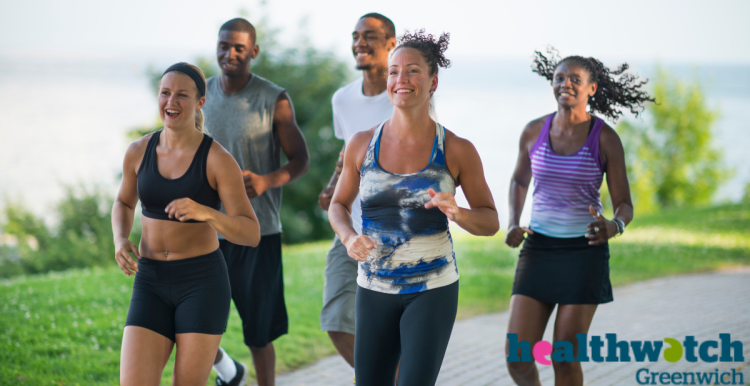More time, energy, and feeling fitter would motivate people to be more active
UK adults are more than twice as likely to spend most of their time watching TV (38%) compared to cooking/preparing food (15%).

A new YouGov poll, commissioned by World Cancer Research Fund, has found that nearly 3 in 4 (72%) of UK adults said that having more time, energy and feeling fitter would motivate them to be more physically active. Physical activity was defined as including walking, household chores, climbing the stairs or playing sport. Of those 3 in 4 (72%), 4 in 10 (43%) opted for energy and feeling fitter as the biggest motivators for getting more active and 3 in 10 (29%) opted for more time.
This year, the charity’s Cancer Prevention Action Week (19-25 February 2024), is encouraging people to Make Your Move by finding spare moments in their day to fit in short bursts of activity a few times a day – also known as ‘exercise snacking*’ – that get them slightly breathless. Stationary, idle or downtime moments could be used to do wall planks while waiting for the kettle to boil, squats while scrolling on social media, or dancing to your favourite song while cooking.
Whether people do a little or a lot of activity on a regular basis, the campaign is for everyone. Make Your Move wants to help people become more active throughout their daily lives, now and in the long-term, so they can start feeling its health benefits.
THE BENEFITS OF BEING PHYSICALLY ACTIVE
Being physically active** has many health benefits. It can help reduce the risk of breast, colon and endometrial cancers. Emerging evidence shows that just 3.5 minutes per day of vigorous activity like stair climbing can reduce overall cancer risk by 17–18%, compared to doing no vigorous activity1. There is also strong evidence that aerobic physical activity, including walking, can help you maintain a healthy weight. We know that living with overweight or obesity is linked to at least 13 different cancers.
Being physically active can also improve cardiovascular health and can help manage hypertension (high blood pressure) and lowers the risk of Type 2 diabetes. Additionally, physical activity has mental health benefits as it can reduce and manage symptoms of anxiety and depression.
Doing regular short bouts of movement or exercise throughout the day, where you are getting slightly breathless, is a type of ‘exercise snack’ and counts towards our physical activity targets. For some, breaking up movement throughout the day is more practical due to time constraints. In the UK, it’s recommended that adults do at least 150 minutes of moderate-intensity activity a week, like brisk walking or gardening, or 75 minutes of vigorous-intensity activity, such as fast dancing.
Other findings from the poll showed that UK adults are more than twice as likely to spend most of their time watching TV (38%) compared to cooking or preparing food (15%). Out of the respondents that said they spend most of their time playing video games, 40% of those spend 3 hours or more playing in a typical day. Also, 28% of respondents who spend most of their time on social media, said they spend 3 hours or more doing so every day.
Ellie Philpotts (27), who is living beyond a Hodgkin Lymphoma cancer diagnosis, said:
"I was diagnosed with cancer when I was just 15, on the cusp of getting my own independence and planning my career. After dealing with the late effects cancer treatment has had, I’m on a mission to future proof my body and health as far as I can."
"I’ve incorporated ‘exercise snacking’ when doing daily tasks, such as squatting while brushing my teeth – it’s a great way to get moving instead of just standing still."
Rachael Gormley, Chief Executive Officer at World Cancer Research Fund, said:
Being physically active is one of our Cancer Prevention Recommendations and can help prevent at least 3 types of cancer. That’s why for our annual Cancer Prevention Action Week, we’re encouraging people to move their bodies more regularly. No matter what age you are, it’s important to be active, and it’s never too late to start moving more to help reduce the risk of cancer later in life.
*About exercise snacking
Exercise snacking is a relatively new approach to physical activity, which focuses on short bursts of activity at least a couple of times a day, rather than say going on a run or heading to the gym for an hour. In our increasingly busy lives, exercise snacking – which can be done at home, at work or in a public space like a park – is a convenient, and time-saving way to be more active. These bursts include power walking, climbing the stairs, carrying heavy shopping, and vigorous housework.
**About physical activity
Being physically active can help to improve cardiovascular health by helping to prevent and manage heart disease, stroke and cancer. It can also help manage hypertension (high blood pressure) and lowers the risk of Type 2 diabetes. Additionally, physical activity has mental health benefits as it can help reduce and manage symptoms of anxiety and depression. Physical activity can help people’s brains stay healthy, for example it can improve cognitive functioning such as being able to remember things and can also reduce the risk of dementia. Not only this, but it can also increase our self-esteem and confidence as well as make us feel good.
About the poll
All figures, unless otherwise stated, are from YouGov Plc. The total sample size for the 2023 results was 2,045 adults.
The surveys were carried out online between the 24th and 27th of November 2023. The figures have been weighted and are representative of all UK adults (aged 18+).
Reference
- Stamatakis E, Ahmadi MN, Friedenreich CM, et al. Vigorous Intermittent Lifestyle Physical Activity and Cancer Incidence Among Nonexercising Adults: The UK Biobank Accelerometry Study. JAMA Oncol.2023;9(9):1255–1259. doi:10.1001/jamaoncol.2023.1830
Originally published on: More time, energy and feeling fitter would motivate people to be more active - World Cancer Research Fund (wcrf-uk.org)

